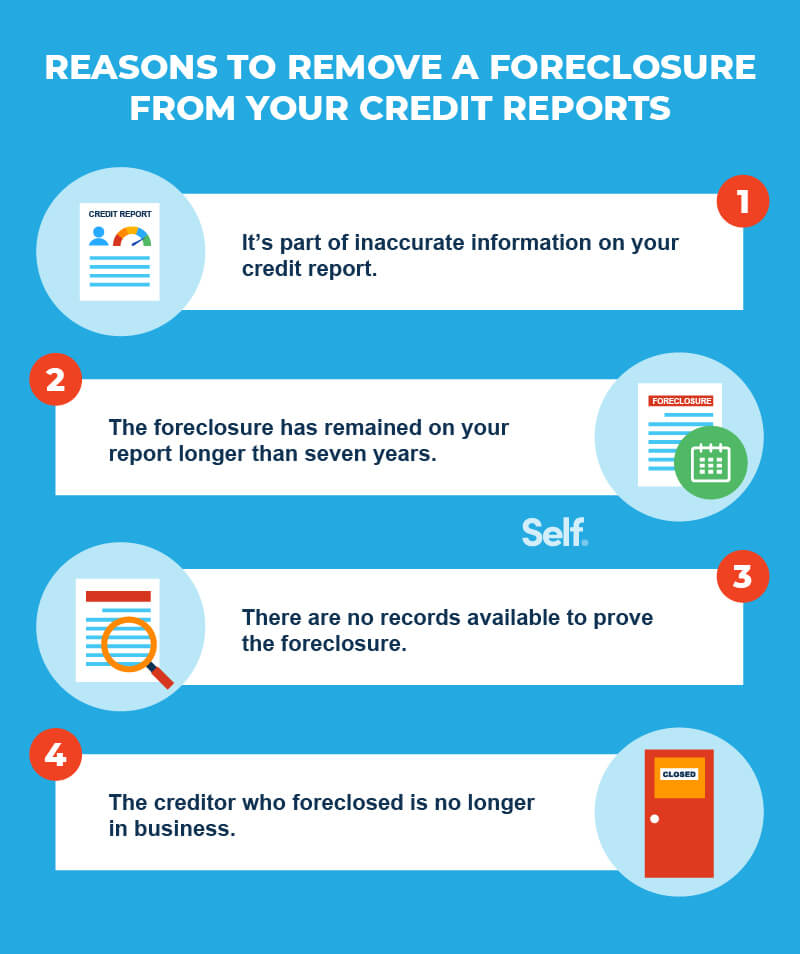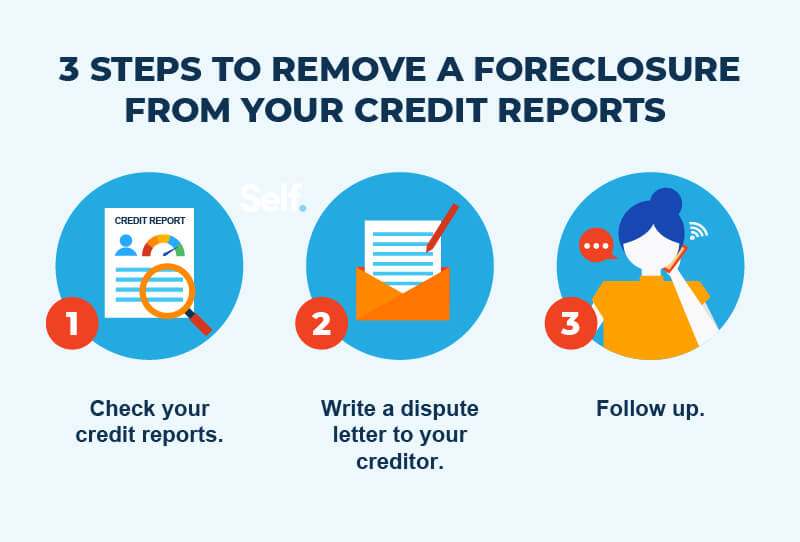How to Remove a Foreclosure from Your Credit Reports
Published on: 07/06/2021
A foreclosure can have a drastic impact on your credit score and prevent you from getting loans for years. So if you see inaccurate information about a foreclosure on your credit reports, it’s vitally important to seek to have it removed.
Several different kinds of inaccuracies and errors on your credit reports can ruin your good credit. Sincce a foreclosure can reduce your credit score by more than 200 points, it's among the worst inacurracies to have your credit report.[1]
Unfortunately, you might see errors of this type when you read your credit reports from the three major credit bureaus, also known as credit reporting agencies: Equifax, Experian, and TransUnion.
If you really did go into foreclosure, and it’s reported accurately on your credit reports, you have to deal with the consequences. It will remain on your reports for seven years.
But if an inaccurate foreclosure appears on your credit reports, there are a few ways to try disputing and removing it.
It’s a good idea to monitor your credit reports for other errors. Under the Fair Credit Reporting Act, you’re entitled to get a free copy of your credit report every year, available at annualcreditreport.com. Some lenders also provide customers with information about their credit score.[2] You can take advantage of that to see where you stand.

Besides finding inaccurate information, you also might be able to remove a foreclosure from your credit reports because:
- The foreclosure has remained on your credit reports longer than seven years.
- There are no records available to prove the foreclosure.
- The lender or creditor who foreclosed is no longer in business.
It’s important to have an inaccurate foreclosure entry removed because it can significantly hurt your credit history. Credit scoring by FICO® and VantageScore reflect these negative marks. A low FICO score or VantageScore number will make it harder to obtain new credit and can result in higher interest rates when you do.
The following section contains a few steps you can take to dispute foreclosures and try to have them removed from your credit reports.

1 - Check your credit reports
Request your free credit reports from each of the three major credit bureaus. Check each for any errors or mistakes showing a foreclosure mark on your credit reports.
2 - Write a dispute letter to your creditor
Upon examining your file, you may notice that a foreclosure has remained on your credit report for longer than seven years. Or you may know that the former creditor is out of business now.
Alternatively, you may research the foreclosure item and discover that there are no records available to prove the foreclosure happened.
In any of these cases, you can write a dispute letter to the creditor/lender, mortgage servicer, or major credit bureaus to dispute the error. (Note: The mortgage lender may be different from the servicer, which usually processes your payments, keeps track of what you owe, and answers any questions you may have.)
The Federal Trade Commission offers a sample letter on its website that you can use as a template for your dispute.[3]
In your dispute letter, include your name, address and mortgage account number. Then detail the exact nature of the error you believe occurred. You can also register a dispute by phone.
The websites, addresses and phone numbers for disputes for the three major credit bureaus are:
- Equifax website; or write to Equifax, P.O. Box 740256, Atlanta, GA, 30374-0256; (866) 349-5191.
- TransUnion website; or write to TransUnion LLC, Consumer Dispute Center, P.O. Box 2000, Chester, PA, 19016; (800) 916-8800.
- Experian website; or write to Experian, P.O. Box 4500, Allen, TX, 75013; (888) 397-3742.
3 - Follow up with creditors and bureaus
Make sure to follow up with the credit reporting agencies or creditors to ensure that the dispute is being handled and you have that error removed from your credit reports. If necessary, send a second letter or initiate contact a second time on the bureaus’ websites.
A mortgage servicer must acknowledge receipt of your letter within five days of receiving it and must respond within 30 days.
If you believe your servicer did not follow the proper procedures in responding to your letter, you can contact the Consumer Financial Protection Bureau online or by phone, and the CFPB will work with the servicer to obtain a response.[4]
In the process of dealing with a foreclosure, your mortgage lender may make other kinds of errors. These include:[4][5]
- Being unable to prove it owns the loan
- Failing to act within the statute of limitations
- Using a defective affidavit or declaration
- Failing to follow state procedures
- Dual tracking — foreclosing on a borrower while also working with the borrower on a loan modification agreement or other alternatives. (This is illegal.)
Also, under federal law, a mortgage foreclosure case can’t start until a borrower is more than 120 days delinquent on a mortgage obligation.[5]
After you file a dispute or disputes, review your credit reports to make sure the bureaus deleted the inaccurate information. If the bank or other lender persists in reporting information you disputed, make certain the credit bureaus include a notice that you disputed the information.
A safeguard: A lender must file a lawsuit before foreclosure
It’s worth mentioning that, even if your mortgage is in delinquency, a lender can’t foreclose in most cases before filing a lawsuit. A court can dismiss the lawsuit, in which case the bank must either refile the lawsuit or look for another way to collect.[6]
The lender may also file an action called lis pendens, a formal notice that alerts those who have an interest in the property of a pending lawsuit. A lis pendens acts as a sort of property lien, which can render a property unmarketable or unsellable until it’s lifted.
In addition to a court dismissing a lawsuit, a mortgage lender may file a voluntary dismissal on its own if, for example, you negotiate a means of dealing with the debt outside the parameters of foreclosure. Either way, if the lawsuit is dismissed, the lis pendens will be lifted.[7]
If you don’t feel comfortable taking these steps yourself, you can contact a reputable credit repair company[12], which will assist you for a fee.
How long will a foreclosure stay on your credit reports?
If your foreclosure is accurate, and not a mistake or error, then, unfortunately, it will remain on your credit report for seven years. The late payments that led up to your foreclosure will also remain on your credit reports and have a negative impact on your credit score.[8]
How does a foreclosure affect my credit score?
Everyone’s situation is different. It’s important to remember that your credit score is made up of various factors.
Time is your best ally in this situation. Your credit score could improve as the late payments and foreclosure age. As items on your credit reports age, they tend to have less of an impact on your credit score.
One alternative to foreclosure is a deed-in-lieu, in which the homeowner deeds the property back to the mortgage issuer in exchange for being released from the mortgage debt obligation.[9]
A lender isn’t obliged to accept an offer of a deed in lieu of foreclosure, and there are a couple of things you should consider before going this route.
First, if the lender forgives you more than $600 worth of debt, the IRS will count this as income, meaning you’ll have to pay taxes on it. Second, your credit will be negatively affected, though not as badly as it would if the bank went forward with foreclosure proceedings.
How long will a short sale stay on your credit reports?
In real estate, a short sale is an attempt to sell your home for an amount less than what you owe. You must have the lender’s approval to do this, and not every mortgage lender will let borrowers pursue this course.
The upside: You’ll likely be able to get back into the housing market sooner. Most mortgage lenders won’t give you a mortgage loan for several years after a foreclosure. You’ll face a waiting period of three years for an FHA or USDA home loan, and seven years for a new mortgage from Fannie Mae or Freddie Mac.[10]
By contrast, with a short sale, former homeowners may be eligible to re-enter the home-buying market after only two years.[11]
The downside: Short sales, like foreclosures, hurt your credit score. If you’ve got very good credit (or even a perfect credit score), a short sale could cost you 150 points or more. If your FICO score is in the average or good range, you could drop 100 points. However, short sales have less effect on your credit score than foreclosures.[11]
If you already have a bad credit score, you’ll lose fewer points, but it will dig you deeper into the credit hole. In any case, it will become part of your payment history.
How does a short sale affect my credit score?
As mentioned, if you continue to make mortgage payments until your short sale closes, you might be able to obtain a mortgage for a new home within two years and even less if you continue paying the mortgage until your house is sold.
Short sales affect your credit score and can remain on your credit reports for seven years, like foreclosures. But your credit score will likely increase more quickly than it would following a foreclosure, usually within two years. To escalate the process of improving your credit score, you should strive to keep credit card balances low and always pay bills on time.
If you’re in the unfortunate situation of having a foreclosure on your credit reports, check whether there is a mistake and you can have it removed. It will help your credit score and your financial situation if you can expunge it.
Source
- Self Financial. “How Does Foreclosure Affect Your Credit?” https://www.self.inc/blog/foreclosure-affects-credit. Accessed June 16, 2021.
- Federal Deposit Insurance Corp. “Consumer Assistance Topics: Credit Reports,” https://www.fdic.gov/resources/consumers/consumer-assistance-topics/credit-reports.html. Accessed June 16, 2021.
- Federal Trade Commission. “Sample Letter for Disputing Errors on Your Credit Report with Information Providers.” https://www.consumer.ftc.gov/articles/0485-sample-letter-disputing-errors-your-credit-report-information-providers. Accessed May 29, 2021.
- Consumer Financial Protection Bureau. “Requesting your servicer correct errors template,” https://files.consumerfinance.gov/f/201401_cfpb_mortgage_request-error-resolution.doc. Accessed May 29, 2021.
- Consumer Financial Protection Bureau. “Real Estate Settlement Procedures Act,” https://files.consumerfinance.gov/f/201308_cfpb_respa_narrative-exam-procedures.pdf. Accessed June 16, 2021.
- Sapling. “What Happens If a Foreclosure Is Dismissed?” https://www.sapling.com/12078704/happens-foreclosure-dismissed. Accessed May 29, 2021.
- SF Gate. “What Is a Notice of Voluntary Dismissal & Release of Lis Pendens Mean?” https://homeguides.sfgate.com/notice-voluntary-dismissal-release-lis-pendens-mean-53129.html. Accessed May 29, 2021.
- Experian. “Can I Get a Foreclosure Removed From My Credit Report?” https://www.experian.com/blogs/ask-experian/can-i-get-a-foreclosure-removed-from-my-credit-report/. Accessed May 29, 2021.
- Investopedia. “Deed in Lieu of Foreclosure,” https://www.investopedia.com/terms/d/deed_in_lieu_of_foreclosure.asp. Accessed May 29, 2021.
- Self Financial. “Credit Scores Needed for VA and FHA Loans,” https://www.self.inc/blog/credit-scores-va-fha-loans. Accessed May 29, 2021.
- Federal Trade Commission. “Getting a Mortgage After a Short Sale,” https://www.consumer.ftc.gov/articles/0373-getting-mortgage-after-short-sale. Accessed May 29, 2021.
- Consumer Financial Protection Bureau. "How can I tell a credit repair scam from a reputable credit counselor?" https://www.consumerfinance.gov/ask-cfpb/how-can-i-tell-a-credit-repair-scam-from-a-reputable-credit-counselor-en-1343/. Accessed May 29, 2021
About the Author
Lauren Bringle is an Accredited Financial Counselor® with Self Financial – a financial technology company with a mission to increase economic inclusion by helping people build credit and savings so they can build their dreams.
Editorial Policy
Our goal at Self is to provide readers with current and unbiased information on credit, financial health, and related topics. This content is based on research and other related articles from trusted sources. All content at Self is written by experienced contributors in the finance industry and reviewed by an accredited person(s).
